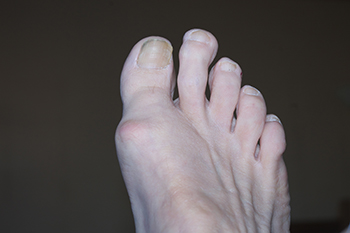
Morton's toe is characterized by the second toe appearing to be longer than the big toe. It is a prevalent foot structure that affects weight distribution and occasionally causes discomfort. Morton’s toe is a hereditary trait that has also been associated with potential advantages in athletics, as many professional athletes exhibit Morton's toe. Morton's toe is not actually caused by the second toe itself. In fact, its root lies in the metatarsals. When the first metatarsal is shorter, it makes the second toe seem longer. This condition leads to uneven weight distribution across the other bones of the feet. Over time, Morton’s toe may result in aches and pains, primarily felt at the base of the first two metatarsal bones and at the head of the second metatarsal. Fortunately, conservative treatments, such as padding, specific exercises, medication, and wearing custom orthotics can effectively manage the associated pain. For cases where conservative measures fall short, surgical options that call for removing certain toe joints are available. Seeking early intervention and consulting with a podiatrist can guide individuals with Morton's toe toward an appropriate and personalized course of action to maintain foot health and overall well being. For more information on Morton’s toe, it is suggested that you make an appointment with a podiatrist.
If you have any concerns about your feet, contact one of our podiatrists from Sayville Foot Care. Our doctors can provide the care you need to keep you pain-free and on your feet.
Biomechanics in Podiatry
Podiatric biomechanics is a particular sector of specialty podiatry with licensed practitioners who are trained to diagnose and treat conditions affecting the foot, ankle and lower leg. Biomechanics deals with the forces that act against the body, causing an interference with the biological structures. It focuses on the movement of the ankle, the foot and the forces that interact with them.
A History of Biomechanics
- Biomechanics dates back to the BC era in Egypt where evidence of professional foot care has been recorded.
- In 1974, biomechanics gained a higher profile from the studies of Merton Root, who claimed that by changing or controlling the forces between the ankle and the foot, corrections or conditions could be implemented to gain strength and coordination in the area.
Modern technological improvements are based on past theories and therapeutic processes that provide a better understanding of podiatric concepts for biomechanics. Computers can provide accurate information about the forces and patterns of the feet and lower legs.
Understanding biomechanics of the feet can help improve and eliminate pain, stopping further stress to the foot.
If you have any questions please feel free to contact our office located in Sayville, NY . We offer the newest diagnostic and treatment technologies for all your foot and ankle needs.
